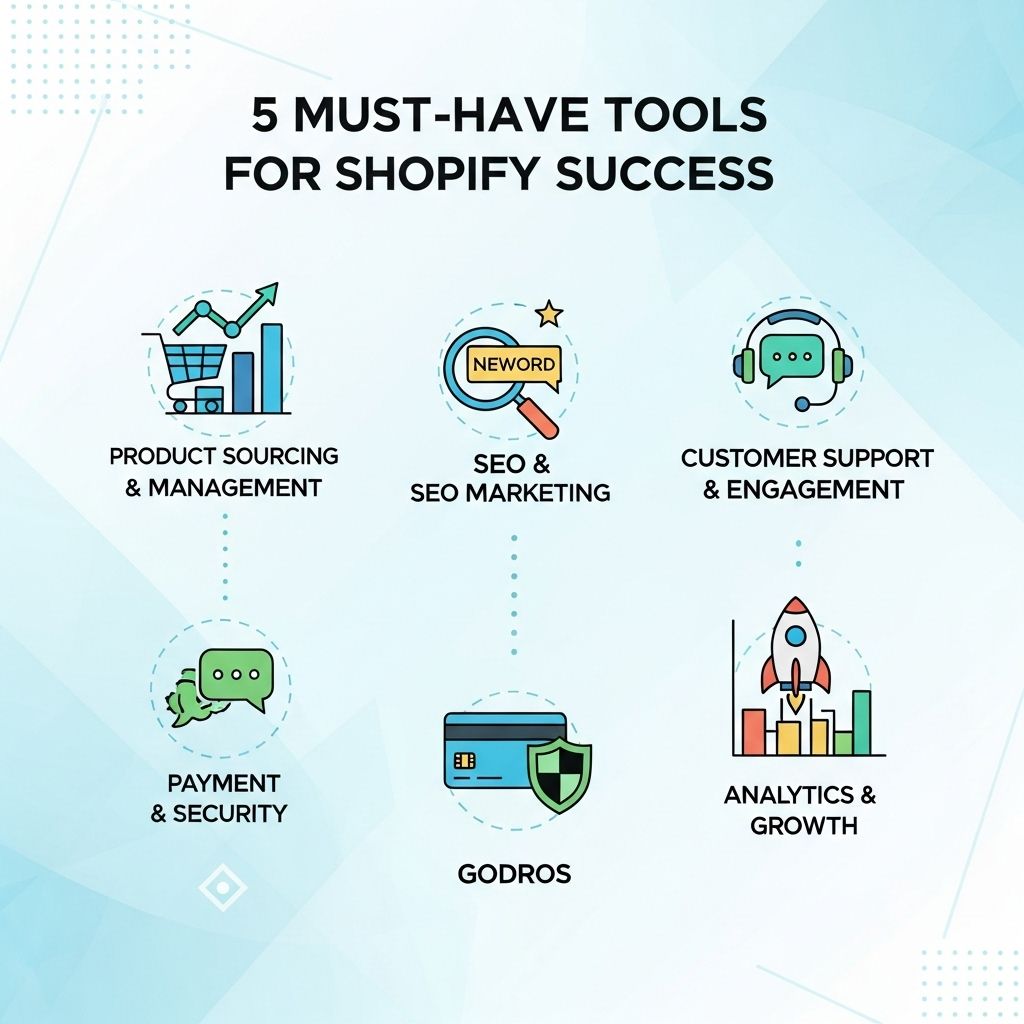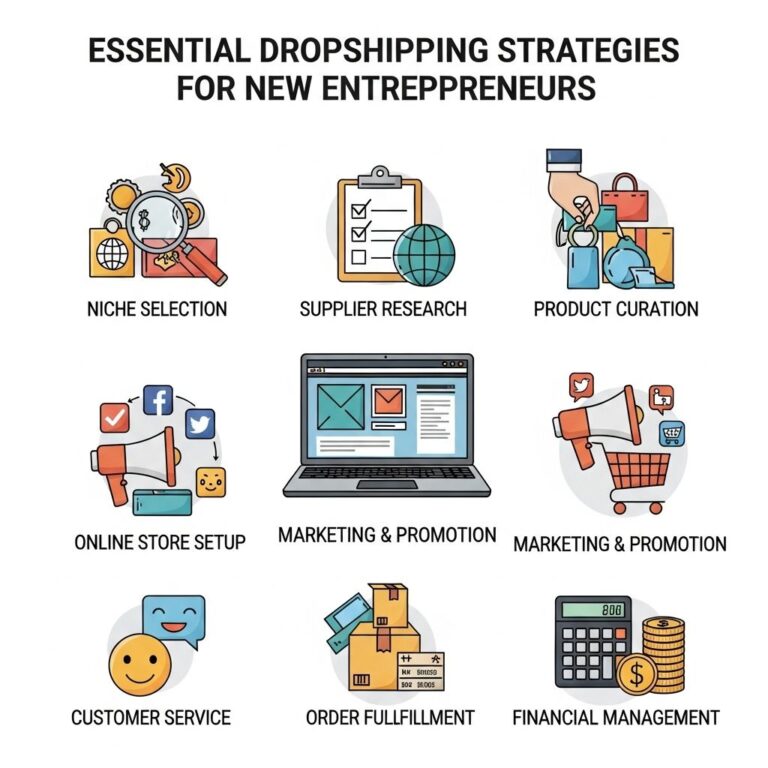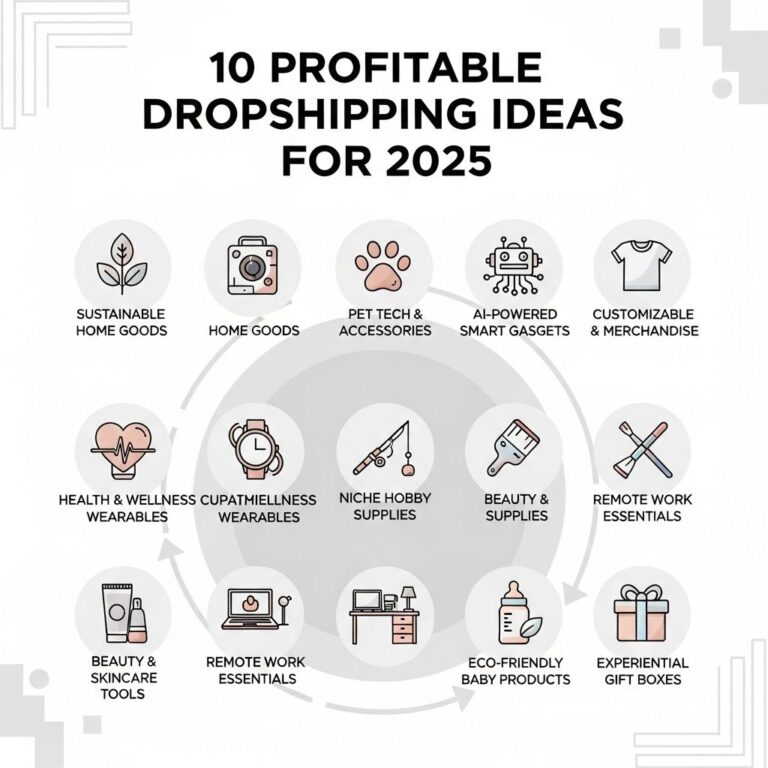In the fast-paced world of e-commerce, Shopify has emerged as a leading platform for entrepreneurs looking to build their online stores. With its user-friendly interface and vast ecosystem of applications, Shopify enables businesses to scale efficiently. However, success doesn’t come solely from the platform itself; it requires the right tools to maximize its potential. In this article, we will explore five essential tools that every Shopify store owner should consider to enhance their operations, improve customer experience, and ultimately drive sales.
Table of Contents
1. Shopify Apps for Enhanced Functionality
Shopify’s app store features thousands of applications designed to expand the platform’s built-in capabilities. Here are some categories of must-have apps:
- Marketing Automation: Tools like Klaviyo and Omnisend help automate email campaigns and segment audiences effectively.
- Customer Support: Apps such as Zendesk and Gorgias facilitate efficient customer interactions through live chat and ticketing systems.
- Inventory Management: Tools like TradeGecko allow for seamless stock management across multiple channels.
Top Recommended Apps
| App Name | Description | Key Features |
|---|---|---|
| Klaviyo | Email marketing platform | Segmentation, automation, analytics |
| Gorgias | Helpdesk and support | Multi-channel support, automation, reporting |
| TradeGecko | Inventory management | Multi-channel syncing, forecasting, reporting |
2. Analytics Tools for Data-Driven Decisions
Understanding your customers and their behaviors is crucial for e-commerce success. Leveraging analytics tools allows store owners to gain insights into sales trends, customer preferences, and overall performance. Some powerful options include:
- Google Analytics: Offers in-depth data on website traffic, user behavior, and conversion rates.
- Hotjar: Provides heatmaps and session recordings to visualize how users interact with your site.
- Shopify Analytics: Built-in analytics that tracks sales, orders, and customer behavior right from the dashboard.
Utilizing Data Analytics
To make the most of these analytics tools, consider taking the following steps:
- Set clear goals for your online store.
- Regularly review analytics data to identify patterns and trends.
- Use insights to optimize product listings, adjust pricing, and refine marketing strategies.
- A/B test different elements of your store based on analytics findings.
3. SEO Tools for Improved Visibility
Search Engine Optimization (SEO) is vital for driving organic traffic to your Shopify store. Utilizing specialized SEO tools can help you optimize your site for search engines effectively:
- Ahrefs: A comprehensive tool for keyword research, backlink analysis, and site auditing.
- SEMrush: Offers SEO tools along with PPC, social media, and content marketing analysis.
- Yoast SEO: A plugin that helps optimize on-page SEO elements for Shopify users.
SEO Best Practices
Implementing SEO strategies can significantly enhance your store’s visibility. Keep these best practices in mind:
- Conduct thorough keyword research to identify terms your audience is searching for.
- Optimize product descriptions, titles, and meta tags with relevant keywords.
- Build high-quality backlinks by collaborating with influencers and creating shareable content.
- Ensure your website is mobile-friendly and loads quickly.
4. Social Media Management Tools
In today’s digital landscape, a robust social media presence is essential for branding and customer engagement. Social media management tools can streamline posting, monitoring, and analytics:
- Buffer: Simplifies the scheduling and publishing of social media posts across various platforms.
- Hootsuite: Offers comprehensive social media management, including scheduling, analytics, and monitoring.
- Canva: A design tool that helps create stunning visuals for social media campaigns.
Strategies for Effective Social Media Management
- Identify your target audience and select the appropriate social media platforms.
- Develop a content calendar to maintain consistency in posting.
- Engage with your audience through comments, direct messages, and polls.
- Monitor analytics to evaluate the performance of your posts and adjust strategies accordingly.
5. Payment Processing Solutions
Ensuring a seamless checkout experience is vital for converting visitors into customers. Reliable payment processing solutions provide the security and convenience shoppers expect:
- Shopify Payments: The native payment gateway that integrates seamlessly with Shopify stores.
- PayPal: A widely recognized payment method that builds trust with customers.
- Stripe: A flexible payment processor that supports various payment types and currencies.
Choosing the Right Payment Solution
When selecting a payment processing solution for your Shopify store, consider the following factors:
- Transaction fees and payment processing rates.
- Security features, such as fraud detection and SSL encryption.
- Compatibility with your store’s existing infrastructure.
- Customer support options and response times.
Conclusion
Building a successful Shopify store requires more than just a great product; it necessitates the strategic use of various tools to streamline operations, engage customers, and optimize performance. From enhancing functionality with apps to leveraging data analytics for informed decision-making, the right set of tools can make a significant difference. By integrating these essential tools into your e-commerce strategy, you position your store for sustainable growth and long-term success.
FAQ
What are the essential tools for Shopify success?
Some must-have tools for Shopify success include Oberlo for dropshipping, Klaviyo for email marketing, SEO Manager for optimizing search visibility, Yotpo for collecting customer reviews, and Google Analytics for tracking website performance.
How can I improve my Shopify store’s SEO?
Improving your Shopify store’s SEO can be achieved by using SEO-friendly themes, optimizing product descriptions with keywords, utilizing SEO Manager apps, and regularly updating content to enhance search visibility.
What is the role of email marketing in Shopify?
Email marketing plays a crucial role in Shopify by helping to engage customers, nurture leads, promote products, and drive repeat sales through targeted campaigns and personalized communication.
Can I use Shopify for dropshipping?
Yes, Shopify is an excellent platform for dropshipping, allowing you to sell products without holding inventory, using apps like Oberlo to source and manage products seamlessly.
What tools can help with Shopify analytics?
Tools like Google Analytics, Shopify’s built-in analytics, and third-party apps like Hotjar or Lucky Orange can provide valuable insights into customer behavior, traffic sources, and sales performance.









